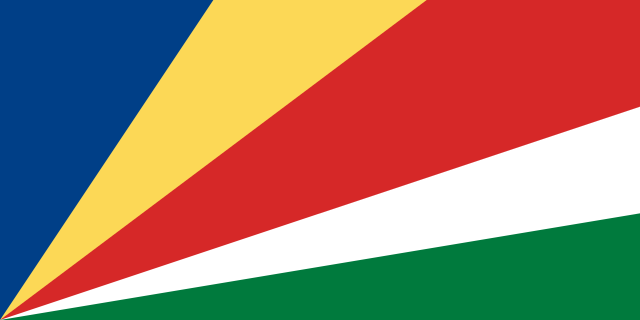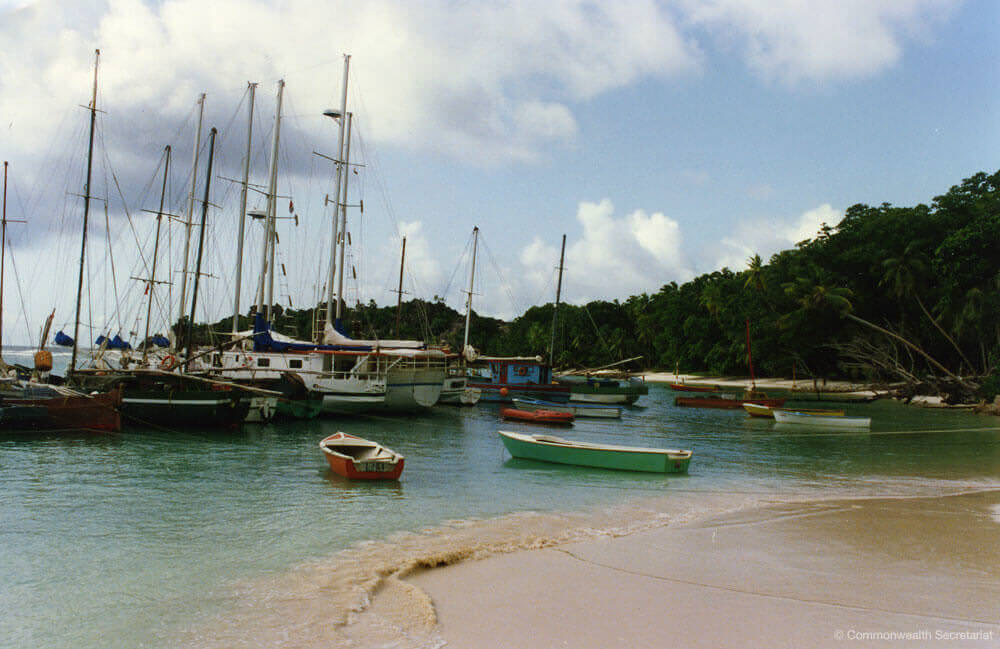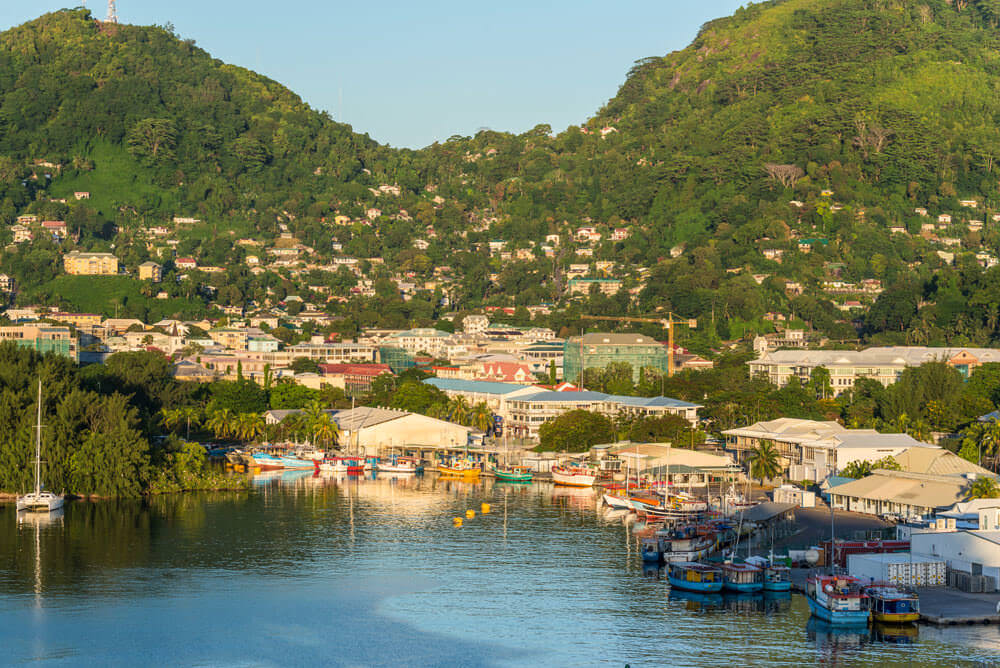Seychelles

Capital city: Victoria
Population: 98,891 (2021)
Land area: 459 km²
Official languages: French, English, Seychellois Creole
Legal system: Mixed legal system based on civil law derived from the French Napoleanic Code and common law
Time zone: GMT+4
Currency: Seychellois rupee (SCR)
GDP: 1.60 USD Billion (2021 est.)
Main industries: Tourism, fishing, farming, oil drilling and manufacturing
Principal exports: Canned tuna, frozen fish, petroleum products (reexports)
The island republic of Seychelles is located in the western Indian Ocean at a junction between Asia and Africa, with Kenya 1,800 km to the west and Madagascar 1,100 km to the southwest. The archipelago contains 115 islands with a total land area of 444 kmsq; the largest of which is Mahe wherein the country’s capital, Victoria, is located. Featured as one of the smallest countries across the globe, Seychelles is a tropical paradise of beaches, lagoons and diverse vegetation and marine life with two groups of islands; the Mahe group of more than 45 islands are rocky with hill ranges in the inner centre whereas the second group of 70 islands consist of flat coralline islands.

Demographics
Seychelles’ population was recorded to be 96,387 by July 2021. The islands of Seychelles are sparsely populated with a population density of 214 per kmsq. The Seychellois people are predominantly Creole of East African and Malagasy heritage with minority groups of French, Indian, Chinese and Arab populations. Seychelles has a more aged population with 31% being aged 25 or below. 58% of Seychellois live in urbanised areas.
Seychelles has three official languages; Seychellois Creole which is spoken by almost 90% of the population and is also considered as the lingua franca of the country; English, spoken by 5% of the population and is used for commercial and official purposes; and French, which is spoken by 0.7% of citizens. The predominant religion practised in Seychelles is Christianity, with 76% citizens being Roman Catholics, 10.5% being Protestant and 2.4% belonging to other schools. The remaining population consists of Hindus (2.4%), Muslims (1.6%) and others.
History
Although the existence of Seychelles was known to merchants of the Persian Gulf for centuries beforehand, the first known landing into the territory was recorded in 1609 when the British East India Company reached the islands during their expedition. However, it was the Frenchman Lazare Picault who was the first to explore the archipelago between 1742 and 1744 due to which the area was annexed by France in 1756 and named “Sechelles”. With the eventual defeat of France in the Napoleonic Wars, Sechelles was ceded to Great Britain under the Treaty of Paris in 1814 and renamed Seychelles to be administered under the jurisdiction of Mauritius. As slavery was abolished in the 1830s, Britain resorted to cultivating low labour-intensive crops i.e. coconuts, vanilla, and cinnamon.
By 1903, Seychelles’ status as a dependency of Mauritius to an independent crown colony and was subsequently granted a Legislative Council in 1948. Subsequently, in 1970 a new constitution was drafted granting the state universal suffrage and a governing council of which the members were elected by majority vote. Gradually by 1975 self-governance was allowed to the Seychellois and following the elections of 1976 Seychelles became an independent republic within the Commonwealth on 29 June. James Mancham of the Seychelles Democratic Party (SDP) was made President and Seychelles People’s United Party (SPUP)’s France-Albert Rene became the Prime Minister. However, just a year later during Mancham’s trip abroad, Rene assumed the presidency in a coup de tat led by his party (renamed to the Seychelles People’s Progressive Front [SPPF]). A new constitution was instated in 1979, transforming the republic into a one-party socialist state making the SPPF the only legal political party.
This was short-lived; Rene was faced with multiple coup attempts and rising national pressure as foreign aid began to wane in the 1980s due to which his government began shifting towards democratisation in the early 1990s. With the return of multiparty elections and a revision of the constitution in 1991, the state, with Rene remaining President, discarded the socialist economy framework and reestablished a market-based economy. The government began privatising parastatal companies, promoting foreign investment and prioritised efforts to establish Seychelles as an offshore business and financial hub. By 2004, after winning three consecutive elections, Rene officially stepped down, making Vice President James Michel the next President, who was reelected in 2006 and 2011. Michel announced the early elections in December of 2015 although they were meant to take place in 2016. He won by a narrow margin, almost losing to Wavel Ramkalawan of the Seychelles National Party (SNP) who then filed petitions claiming irregularities in the voting mechanism and demanding the elections be nullified. Although the latter request was not accepted, the Constitutional Court of Seychelles conceded that there was evidence of voting irregularities which resulted in the reduction of consecutive terms allowed down to a limit of 2 terms.
Key Dates
1768 French planters begin settling in Seychelles
1903 Seychelles become an independent British colony
1948 First elections for the Legislative Council take place
1964 France Albert Rene’s Seychelles People’s United Party and James Mancham’s pro-business Seychelles Democratic Party formed- the first two political parties of Seychelles
1966-1970 The Seychelles Democratic Party wins the legislative elections
1976 Seychelles become independent on 29 June; to be governed by a coalition of the two political parties with James Mancham as president and France Rene as prime minister
1977 Rene’s supporters stage a coup against Mancham; Rene declared president.
1978 New constitution implemented, turning Seychelles into a one-party state.
1981 South African-based mercenaries make a failed attempt to restore Mancham to power
1991 Rene restores multiparty democracy and revises the constitution
1998 Rene’s Seychelles Progressive People’s Front wins 30 out of 34 seats in parliamentary elections
2004 President Rene steps down in April, replaced by former vice president James Michel.
2013 Seychelles signs a tax exchange agreement with The Isle of Man in April
2016 Opposition Seychellois Democratic Alliance wins parliamentary elections, breaking the ruling party’s four-decade administration
2020 Wavel Ramkalawan wins the presidency in October

Legal System and Government
As promulgated in the 1993 constitution (since amended) Seychelles is a presidential republic wherein the president is both the head of state and government. They are elected by popular vote and are eligible to hold office for a maximum of two terms of five years; they also appoint their own Council of Ministers, an advisory body. Members of the National Assembly also serve five-year terms and the majority of the seats are filled by popular vote albeit some are reserved for a small portion that is proportionally allotted for parties that win a minimum of one-tenth of the vote.
Seychelles has a hybrid legal system based on Napoleonic Civil Law and English Common Law, as a result of its history as both a French and an English territory in its history. Substantive civil law remains French, whereas substantive criminal law is codified in English, as are both civil and criminal procedural law. The sources of law are mainly through legislation. The National Assembly is the Seychelles legislative branch, which has the power to create, amend and repeal all laws except for certain chapters in the Constitution of the Republic of Seychelles. The supreme law of the country and certain chapters therein, such as the constitutional rights of individuals, can only be amended by a referendum.
Economy
The state has a mixed developing economy that relies mainly on its services sector, the tourism industry in particular, although its manufacturing sector is also steadily growing. The industrial sector currently accounts for roughly 13% of the country’s GDP mainly through food-processing, production of alcoholic and non-alcoholic beverages as well as animal feed, paint and other goods.
Seychelles is among the higher per-capita-fish-consuming countries in the world, within which artisanal fisheries and industrial fisheries form the main components. The artisanal fishery, comprising mainly the local fishers, primarily focuses on demersal and semi-pelagic species. Artisanal fisheries exploit an assortment of species and habitats with a vast array of boat-gear combinations and strategies and produce some 4 500 tonnes per year. The industrial longline fishery is dominated by the South East Asian fleets which target mainly tuna for sashimi markets. Tuna species constitute over 95 per cent of the catches by industrial vessels, which are mainly used for exports. National investment in the development of artisanal fisheries relies heavily upon the revenue and capacity building generated by the industrial fisheries sector, which is a major pillar of the economy. In 2013, fisheries contributed to approximately 1.2 per cent of the national economy (GDP), with an additional 2.9 per cent by food manufacturing.
Endowed with wonderful natural assets in its world-famous beaches and mountain backdrops, the tourism sector is one of the main pillars of the economy, contributing to 39.2% per cent of the Seychelles GDP. The number of international tourists has been on an upward trend since the establishment of the international airport in 1971 with approximately 45% of arrivals coming from Europe. According to the WTTC, in 2019, the total contribution of Travel & Tourism to employment, including jobs indirectly supported by the industry, was 41.8% or 21,000 jobs.
Trade
With a GDP of US$1.12 billion recorded in 2020, the main Seychellois exports for the year were meat, fish and seafood preparations (76%), mineral fuels, oils, distillation products (7.2%), and fish, crustaceans, molluscs, and aquatic invertebrates (6.3%). The main export destinations were France (36%), the UK (22%), Italy (9.8%) and UAE (7.9%). Seychelles’ top imports were mineral fuels, oils, and distillation products (16%), fish, crustaceans, molluscs, and aquatic invertebrates (14%), ships, boats, and other floating structures (10%), and machinery, nuclear reactors, and boilers (6.3%). The main sources for these imports were the UAE (26%), France (11%), Spain (11%), and the UK (6.9%).
Seychelles is a member of the Southern African Development Community as a signatory of the Trade Protocol and acceded into the Free Trade Area (FTA) in 2015. Seychelles is also a member of the Common Market for Eastern and Southern Africa (COMESA) and its FTA. Seychelles joined the Indian Ocean Commission (IOC) in 1984.
Investment Opportunities
As tourism is a vital portion of the country’s economy with a growing number of tourists annually, the Seychellois government is encouraging foreign investment into the industry, specifically looking into sustainable accommodations i.e. eco-lodges and eco-boutique hotels, as well as entertainment centres, speciality restaurants, eco-tours and marinas.
As Seychelles comprises 115 islands, its blue economy is among the world’s most diverse and rich, making it a hub for biodiversity. Under the country’s Blue Economy roadmap, Seychelles hopes to maximise the 1.36 million kmsq of oceans in the most sustainable way as a means to sustain the lifeblood of the country’s economy and also to tackle climate change. As such, the government is promoting foreign investment in areas such as sustainable fisheries, biotech research, maritime legal services, renewable energy development. Foreign investment is also encouraged for the ICT, financial services, agriculture, real estate and health sectors.